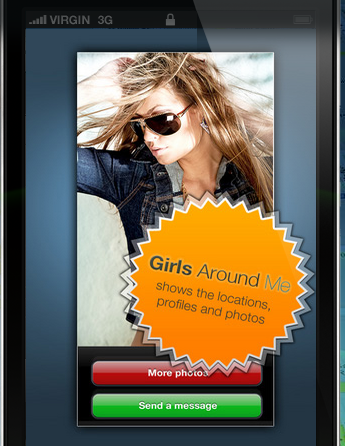
by Larry Magid

As far as I can tell, the app “Girls Around Me” wasn’t violating any laws. But it was high on the creepy scale when, according to reports, women’s identity, photographs and location were being revealed to strangers, even though the women never opted into the service. Although the developer, Moscow-based I-Free, hardly deserves any awards, the app’s a good wake-up call for people to use the privacy settings of legitimate social networking and location services.
The app mashed together information people posted about themselves publicly on Foursquare and Facebook and created a map showing the location and photographs of nearby women. On its website, the company brags that the app can be used to “Browse photos of lovely local ladies and tap their thumbnail to find out more about them.” It’s offered for those “In the mood for love, or just after a one-night stand.” An image that resembles a radar screen with a silhouette of an apparently naked woman adorns the home page.
Late last month Foursquare cut off access to the app so that it can no longer collect the company’s publicly accessible data. In a statement, Foursquare said “This is a violation of our API (application programming interface).” Apple subsequently removed the app from its app store.
Foursquare is a location service typically used to share information about restaurants and other places people visit. It’s common for people to use Foursquare to “check-in” to a location and share that information with their friends. Restaurant-goers often use it to recommend specific meals; and it’s possible to use the service to let friends locate you in real time, perhaps to stop by to say hello or share a drink or a meal.
Foursquare users can connect their account to Facebook and, when they do, they are asked to specify who can see their information. When I checked, it was set to “Friends.” But you can also set it to Public, which means anyone can see it, or “only me,” which hides it from everyone but yourself. It’s also possible to link Foursquare with Twitter. Although it’s possible to limit who can see your tweets, the default setting — which very few Twitter users change — is for tweets to be public.
Take responsibility for your own privacy
The fracas behind the Girls Around Me app is a reminder that we all have a responsibility to protect our own privacy. I’m not condoning their tasteless and tacky service, but from everything I can tell, the company didn’t hack into any servers or tap into anyone’s private information. Everything it did was based on information people posted for public consumption.
Let this be yet another reminder for people to think about over-sharing. To me, it’s obvious that connecting your Foursquare account with Twitter is tantamount to broadcasting your whereabouts. I’ve done that, but I did so knowingly. But it never hurts to remind people to put thought into whether they really want to publicly share where they are and, by implication, where they’re not.
Aside from safety and privacy concerns, location can also be embarrassing, as I realized a few years ago when I went to a particular holiday party instead of another party that some people thought I “should” have gone to. Without thinking, I used Facebook to “check-in” to the party and then realized that my would-be hosts from the other party might see it. To save face, I quickly jumped in my car and drove 35 miles to put in an appearance at the other party.
I’m sure my wife will be pleased to know that I never used the Girls Around Me app when it was available, but I have used Foursquare and Facebook’s check-in features and, when you sign into Foursquare via Facebook, you have to go out of your way to change the default from Friends to Public. Facebook also lets you disclose your location from its own mobile app, but you don’t have to and, if you do, you get to decide who can see it each time you post. It’s very important that users know that the settings are “sticky,” so if you post something publicly, your next post will also be public unless you change it to a more limited audience. The same is true with Google+.
Benefits of location sharing
I have no problem with location services. I use several, including Glympse, which allows me to share my location with friends and family in real time so that they can track my movements and whereabouts as I drive, ride my bike or walk around. This can also be reassuring to family members, who can use it to make sure that loved ones — parents for instance — know where they are and when they’ll get to their destination.
Checking in with Facebook and Foursquare can be fun, as long as you’re in control of who knows where you are. It’s up to all of us to learn to use these services carefully and up to companies to employ its best practices to minimize the risk of unintended consequences.
This article first appeared in the Mercury News
Be the first to comment